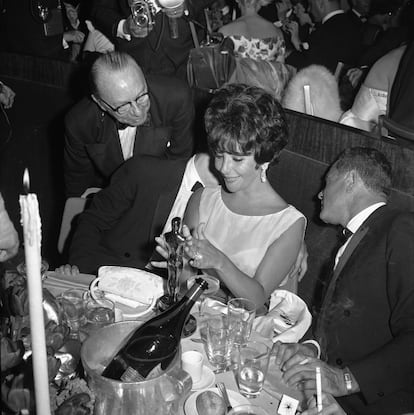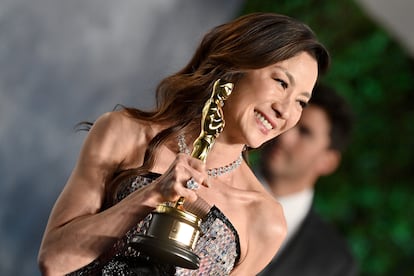Why do we still care about the Oscars, even if we haven’t seen the nominated films?
The debate over whether or not Greta Gerwig or Margot Robbie should have been nominated for ‘Barbie’ reveals that, despite the drop in viewership, these Hollywood awards ceremonies still generate an emotional connection


“Greta & Margot, while it can sting to win the box office but not take home the gold, your millions of fans love you,” Hillary Clinton tweeted. The dramatic tone of the former US Secretary of State could lead one to believe, without the proper context, that she was alluding to some great injustice, to some violation of these two women’s rights. The tweet, however, was from the day the nominees for this year’s Oscars were announced, and Clinton was referring to the fact that Greta Gerwig and Margot Robbie had been left out of the nominations in the Best Director and Best Actress categories, respectively, with Barbie. Clinton’s message was shared by hundreds of thousands of people and became an object of both validation and ridicule. The former Democratic presidential candidate was not the only one who considered these omissions scandalous; Ryan Gosling, the co-star in Barbie (who was nominated as Best Supporting Actor and who is usually very discreet regarding these issues), expressed in a statement his disappointment at Gerwig’s and Robbie’s absence. And just like them, thousands of people filled the social networks with their discontent for weeks.
The debate generated by this year’s Hollywood awards season, with the Barbie nominations at its center, shows that, despite the drop in viewership, these ceremonies still stir an emotional reaction, and whether or not a celebrity is nominated for an award continues to shape the cultural conversation.
“Basically, we are interested in these awards because they tell us that we should be,” states Robert Thompson, professor of television and popular culture at Syracuse University, in New York, and author of six books on the entertainment industry, via video call. For the academic, one of the reasons behind the obsession they generate is that, over the decades, they have acquired a status of cultural tradition that has allowed them to survive in the era of social media and streaming.
Thompson considers awards ceremonies to be the predecessors of many modern formats, in the sense that they used to be the space where audiences could see their favorite stars in their most intimate settings. That is a monopoly they lost years ago, however, as seeing a famous person having breakfast in their pajamas became an everyday occurrence thanks to reality shows and social networks. “Today we can see celebrities outside of their fictional existences, which means that the excitement of an awards show is not nearly as great as it used to be,” the researcher notes.

In last year’s Oscars broadcast, the television audience increased by 12% compared to the 2022 edition. However, the last decade’s free fall is evident, with the three previous ceremonies (2021, 2022 and 2023) having the lowest viewership in the history of the awards. Thompson, whom the Associated Press dubbed a “pop culture ambassador,” believes that award ceremonies are inevitably starting to seem anachronistic: “If we removed the color from a 21st-century awards broadcast, it would look practically the same as one from the 1950s or 1960s.” Nevertheless, the author argues that considering them irrelevant would be a mistake: even if they are not attracting as many millions of viewers, he points out, they are still surpassing their time slot, garnering the highest ratings of the week and are among the most-watched shows of the entire year.
In addition to the decrease in viewers, awards shows have been in the spotlight in recent years due to their lack of diversity. The Golden Globes — the second-most watched event after the Oscars — did not even have a live broadcast in 2022 after NBC withdrew its support due to allegations of low ethnic representation among the nominees from previous years. The Oscars, meanwhile, were pressured by campaigns like #OscarsSoWhite, which sought a greater presence of non-white people in the acting categories, as well as a media push so that more women were considered for Best Director and Best Script.

These controversies led the Academy of Motion Picture Arts and Sciences to diversify its membership in order to increase the participation of women and ethnic minorities and for this, in turn, to be reflected in the nominated and awarded films. For this reason, Cox believes that, beyond the discussions about cinematographic quality, the awards are, in fact, “an impressive reflection of current social concerns.”
It is in this context that many assumed that Greta Gerwig, who made a female empowerment comedy that earned more than $1 billion at the box office, would be among the nominees for Best Director, and that her absence caused so much outrage. However, other voices, such as Helen Mirren’s — who plays the narrator in Barbie — have tried to downplay the importance of the nominations, believing that the film has already secured its place in history. “What is fantastic is that Barbie was the highest-grossing film that Warner Bros. has ever had in their lives, and do you remember who won best film of the year before last?” the Oscar-winning actress told Variety recently.
Awards ceremonies such as the Oscars are, then, a mixture of celebrity worship, cultural tradition and a kaleidoscope of social debates that fits, according to Robert Thompson, in the context of a major sporting event. For the academic, the closest thing to the excitement caused by these ceremonies is that of a soccer match, because the directors, performers, screenwriters and other nominees are competing live for the statuettes and something unexpected could always happen (like the time when, in 2017, Faye Dunaway announced that the winner of the Oscar for Best Picture was La La Land instead of Moonlight). Even if the show drags on, even if you have to endure some poorly written introductions, you never know when something might happen, says Thompson. “Chris Rock could get slapped. There is always that promise.”
Sign up for our weekly newsletter to get more English-language news coverage from EL PAÍS USA Edition
Tu suscripción se está usando en otro dispositivo
¿Quieres añadir otro usuario a tu suscripción?
Si continúas leyendo en este dispositivo, no se podrá leer en el otro.
FlechaTu suscripción se está usando en otro dispositivo y solo puedes acceder a EL PAÍS desde un dispositivo a la vez.
Si quieres compartir tu cuenta, cambia tu suscripción a la modalidad Premium, así podrás añadir otro usuario. Cada uno accederá con su propia cuenta de email, lo que os permitirá personalizar vuestra experiencia en EL PAÍS.
¿Tienes una suscripción de empresa? Accede aquí para contratar más cuentas.
En el caso de no saber quién está usando tu cuenta, te recomendamos cambiar tu contraseña aquí.
Si decides continuar compartiendo tu cuenta, este mensaje se mostrará en tu dispositivo y en el de la otra persona que está usando tu cuenta de forma indefinida, afectando a tu experiencia de lectura. Puedes consultar aquí los términos y condiciones de la suscripción digital.








































